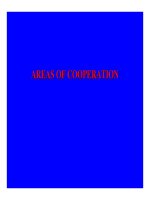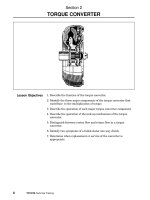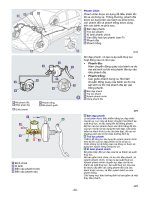Tài liệu ENVIRONMENTAL CODES & ENFORCEMENT doc
Bạn đang xem bản rút gọn của tài liệu. Xem và tải ngay bản đầy đủ của tài liệu tại đây (436.27 KB, 30 trang )
Tribal Solid Waste Management,
ENVIRONMENTAL CODES &
ENFORCEMENT
by:
Anan Tanbouz, P.E. & Ben Banipal, P.E.
AGENDA
•
What is an Integrated Solid Waste Management
Plan (SWMP)
•
Tribal Solid Waste Authority, Codes, Ordinances
& Regulations
•
Tribal Solid Waste Enforcement Issues &
Authority
•
USEPA Solid Waste Contacts
•
Summary
What is an Integrated SWMP?
•
SWMP is not an actual SWM Program
•
Preparing a SWMP is the 1
st
step towards
developing a comprehensive SWM
Program
•
Remember, all SWM Plans are not alike
•
SWMP is structured based on the needs of
community
Components of SWMP
•
EPA suggests Four major components in a typical
SWMP:
•
Past and Present SWM Practices
•
Solid Waste Generation
•
Goals and Objectives
•
Integrated SWM Approaches
–
Source Reduction
–
Recycling
–
Composting
–
Collection and Transfer Station
–
Landfill
Components of SWMP
…Continue
Understanding the Current SWMP:
•
Evaluate current SWM practices
•
Assess individual practices and attitudes
•
Understand the regulatory and institutional climate of
the Tribe
•
Examine multi-jurisdictional opportunities
•
Assess current & potential financial resources
•
Characterize the current waste stream
•
Assess the future waste stream
•
Once the Draft Plan is Written?
•
Having others review the plan.
•
Sharing the plan with the community to
gather public input.
•
Seeking experts to conduct more
detailed analyses of certain selected
alternatives
•
Revising the plan as necessary.
Components of SWMP
…Continue
Tools Available to Develop
SWMP
•
What Tools are Available to Assist in Plan Development
•
Guide for Initiating SWM Planning on Indian Country-
BIA, June 1992
•
Decision-Maker’s Guide to SWM, Vol II- USEPA, August
1995
•
Publications on SWM in Indian Country- USEPA,
December 1996
•
Other Tribal SWM Plans are available via EPA/BIA, IHS
…etc
•
Consortia: AIPC-POEP & ITEC
•
Technical Assistance from All Federal Agencies: EPA,
BIA & IHS, USDA, RUS,HUD
Tribal Authority and Inherent Sovereign
Power to Manage and Regulate Solid Waste
Environmental Codes
•
Tribal Authority to regulate the Tribal environment is
a basic component of Tribal Authority Sovereignty.
William v. Lee, 38 U.S. 217 (1959)
•
Tribes have the right to make their own laws and be
governed by them. Tribes have sovereign power to
enforce tribal laws, including environmental laws,
over their members. Nancy v. EPA., 645F.2d 701
(9th Cir. 1981), cert. Denied sub nom. Crow Tribe of
Indians v. EPA, 454 U.S. 101 (1981).
Tribal Authority and Inherent Sovereign
Power to Manage and Regulate Solid Waste
Environmental Codes …continues
Tribal civil authority over non-Indians has
been recognized in a variety of
circumstances. There are cases not
specifically addressing tribal environmental
authority that are important in the
consideration of tribal regulatory over non-
Indians. Montana v. United States, 450, U.S.
544, 565-6 (1981).
EPA has the authority under Sections 2002,
4004, and 4010 of the Resource
Conservation and Recovery Act (RCRA) to
promulgate site-specific rules as outlined in
this draft guidance document. The authority
to such rules has been upheld by a US
District Court in “Yankton Sioux Tribe v.
EPA,” 950 F. Supp. 1471 (D.S.D. 1996)
Tribal Authority and Inherent Sovereign
Power to Manage and Regulate Solid
Waste Environmental Codes …continues
•
A US Court of Appeals “Backcountry Against Dumps
v. EPA,” 100 F.3d 147 (D.C. Cir. 1996) suggested it
would recognize EPA’s authority to issue such site-
specific rules under RCRA Subtitle D in Indian
Country
• The court noted that EPA and the Tribe need not wait
for Congress to amend RCRA to obtain flexibility in
complying with the revised MSWLF criteria. Instead,
the court suggested that EPA could issue a site-
specific rule satisfying both the intent of RCRA and
an owner or operator’s need for flexibility.
Tribal Authority and Inherent Sovereign
Power to Manage and Regulate Solid
Waste Environmental Codes …continues
•
The Tribe and certain Federal agencies are
required by law to comply with the disposal
of solid wastes on the Reservation under the
Federal Solid Waste Disposal Act (herein “the
SWDA”), as amended by the Resource
Conservation and Recovery Act (herein
“RCRA”), 42 U.S.C.A. §§ 6901-6992; and more
specifically, Subchapter IV, “State or Regional
Solid Waste Plans”, 42 U.S.C.A. §§ 6941-
6949(a), or SWDA §§ 4001-4010.
Tribal Authority and Inherent Sovereign
Power to Manage and Regulate Solid
Waste Environmental Codes …continues
•
These Federal laws also include the various solid waste
regulations promulgated thereunder by the U.S. EPA,
including the comprehensive final rules and regulations
contained in 40 CFR Part 258, for the location, design,
operation, closure, post-closure, and financial assurance
requirements for municipal solid waste landfills.
•
The Tribe intends by the adoption of the Solid Waste
Code, to comply with the SWDA, and the Part 258 Criteria.
Once the Tribe’s Solid Waste Management Plan is
adopted by the Tribal Council, the Director of the Tribe’s
Solid Waste Agency may coordinate with the EPA for its
concurrence of the Tribe’s solid waste program.
Tribal Authority and Inherent Sovereign
Power to Manage and Regulate Solid
Waste Environmental Codes …continues
•
The Tribe has the same flexibility as
States in complying with the Part 258
Criteria under the Site-specific Flexibility
Rulemaking Process. The code prohibits
the disposal of any solid waste except in
MSWLFs which comply with the Part 258
Criteria. Disposal of solid wastes at
“open dumps” is prohibited under the
Solid Waste Code.
Tribal Authority and Inherent Sovereign
Power to Manage and Regulate Solid
Waste Environmental Codes …continues
Enforcement of Tribal Codes
and Regulations
•
Tribal Authority to Enforce - 25 U.S.C. 1302
•
What is being enforced?
•
Who is doing the enforcement?
•
How is the enforcement to be
accomplished?
•
Enforcement Processes
•
Compliance Orders/ Administrative
Orders
•
Tribal Court - Civil Actions
•
Tribal Court - Criminal Actions
Tribal Codes and Regulations
Table of Contents
•
Finding & Purpose of Solid Waste Codes
•
Definitions
•
Designation of Authority
•
Proper Handling, Collection, & Disposal of
SW and/or Hazardous Waste
•
Permit requirements for SWM activities
•
Public involvement & Enforcement
Tribal Codes and Regulations
… continue
•
Finding & Purpose of Solid Waste Codes
–
Purpose of Solid Waste Management Code
–
The Tribe’s Inherent Sovereign Power & Civil
Jurisdiction.
–
The Tribe’s MSW, Solid Waste & Hazardous
Waste Policies
–
The Tribe’s Authority & Commitment to Manage
Tribal Resources
Tribal Codes and Regulations
… continue
•
Designation of Authority
–
Creation of a Tribal Environment Division
–
Duties of the Environment Division with respect to
MSW and SW
–
Duty of the Environment Division to Investigate
Under This Code
Tribal Codes and Regulations
… continue
•
Proper Handling, Collection, & Disposal of
SW and/or Hazardous Wastes:
–
Integrated Solid Waste
–
Open Dumping
–
Burning of Solid Wastes
–
Household Hazardous Waste
–
Special Wastes
Tribal Codes and Regulations
… continue
•
Permit requirements for SWM activities:
–
Define General Permit requirements
–
Permits for the Construction and/or Operation of a
Management Facility
–
Transfer Station
–
Operational requirements for Transfer Stations
Tribal Codes and Regulations
… continue
•
Public Involvement & Enforcement:
–
Public Participation & Hearings
–
Actions on Public Complaints
–
Enforcement Actions
•
Community Members
•
Permitted Haulers and/or Management
Facilities
–
Penalties/Fines
Enforcement of Tribal Codes
and Regulations
25 U.S.C. 1302
Due process is critical throughout the
enforcement process. The Indian Civil
Right Act provides that: “No Indian Tribe
in exercising powers of self-government
shall (8) deny to any person within its
jurisdiction the equal protection of its
laws or deprive any person of liberty or
property without due process of law.”
Enforcement Mechanism
Items to Consider
What is being enforced?
•
Violation of the Ordnance or Code
•
Violation of a regulation or rule
•
Person or entity is creating an imminent
and substantial endangerment to the
public health and environment
•
False or misleading information in an
application, report, permit or other
document filed, maintained or used for
ensuring compliance
Enforcement Mechanism
Items to Consider …continues
Who is being done by the enforcement?
•
Solid Waste Department or Staff?
•
Tribal Administration - includes Tribal Officials,
the Governor’s Staff?
•
Tribal Law Enforcement departments - includes
–
Conservation Officers
–
Wildlife Officers
–
Range Patrols
–
Police Department within the Tribes
Enforcement Mechanism
Items to Consider
How to accomplish Enforcement?
•
Compliance orders
•
Clean up and cease and desist orders
•
Temporary restraining order, preliminary and
permanent injunction or other relief necessary
to protect the public health or the
environment
•
Civil action in Tribal Court
•
Criminal action in Tribal Court









